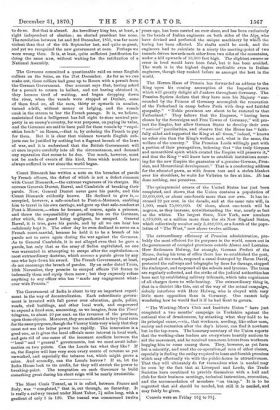Count Bismarck has written a note on the breaches of
parole by French officers, the defect of which is not a defect Common with Count Bismarck,—the extreme vagueness of its charges. He .accnses Generals Ducrot, Barrel, and Cambriels of breaking their parole. Now, General Ducrot never gave his parole, and this -Count Bismarck evidently knows. He declined to give it,— -accepted, however, a safe-conduct to Pont-k-Mousson, enabling -him to travel in his own carriage, and gave up that safe-conduct at Pont-k-Mousson,—when he became, of course, again a prisoner, -and threw the responsibility of guarding him on the Germans, after which, the guard being negligent, he escaped. General Barrel, it is true, gave his parole, and by all we can hear has :sedulously kept it. The other day he even declined to serve on a French court-martial, because he held it to be a breach of his parole not to serve again during the war against the Germans. As to General Cambriels, it is not alleged even that he gave a parole, but only that as the army of Sedan capitulated, no one was warranted in attempting to escape after the capitulation—a most extraordinary doctrine, which assumes a parole given by any one who lays down his sword. The French Government, at least, -do not encourage the breach of paroles. By an order dated Tours, 10th November, they promise to escaped officers 750 francs to indemnify them and equip them anew ; but they expressly refuse anything to any officer who has "made any engagement what- -ever with Prussia."


































 Previous page
Previous page